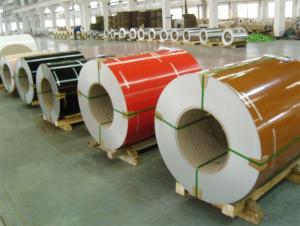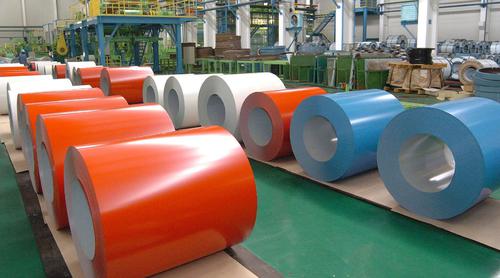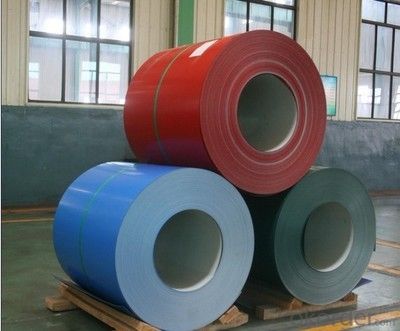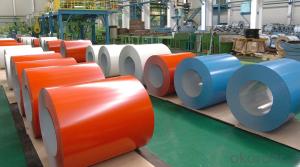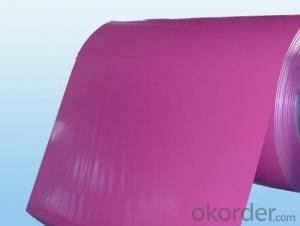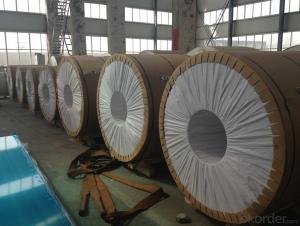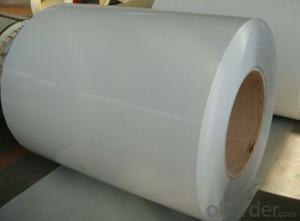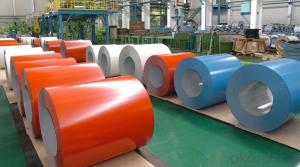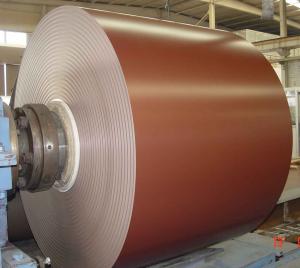5182 Aluminum Coil - Prepainted Aluminum Roofing Coil-3xxx Good Quality
- Loading Port:
- Shanghai
- Payment Terms:
- TT or LC
- Min Order Qty:
- 8 m.t.
- Supply Capability:
- 2000 m.t./month
OKorder Service Pledge
OKorder Financial Service
You Might Also Like
Structure of Prepainted Aluminium Coil Description:
Coated aluminum coil/sheet are of a wide range of colors, which gives wonderful appearance no matter in residential and commercial constructions of great exhibition centers.
The coated aluminum coil/sheet have been widely used in the fields of construction and decoration( garage doors, ceiling etc.), electronic appliances, lighting decoration, air-condition air pipes, sandwich panels and drainages etc.
Main Features of Prepainted Aluminium Coil
1) Perfect weather ability, high strength, no special maintenance
2) Convenient construction, short working time
3Excellent machining heat insulation, sound insulation property and perfect fireproof performance
4) High plasticity, good impact resistance, quakeproof performance and reducing buildings load
5)Goods smoothness, lightweight and rigid, beautiful and cheap
6) Various colors available
7) Simple machining equipments, processing in spot.
Images of Prepainted Aluminium Coil:
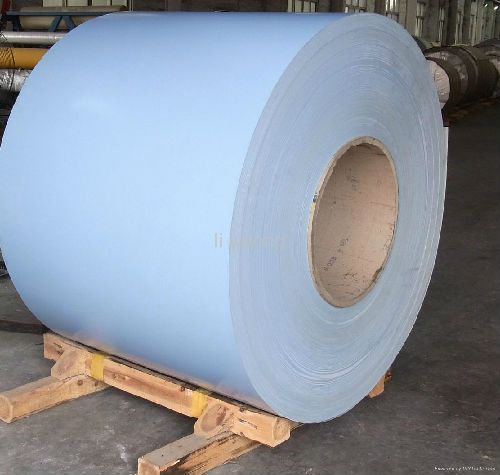
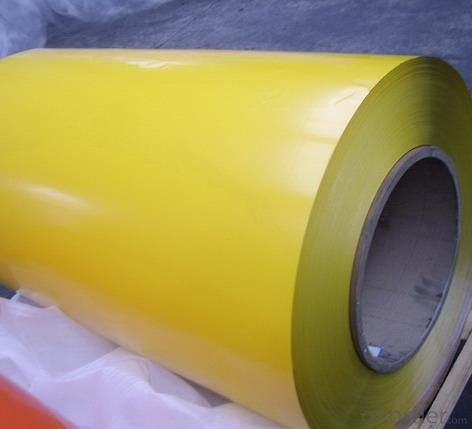
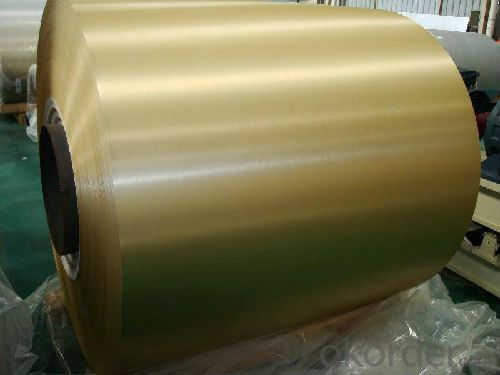
Prepainted Aluminium Coil Specification:
| Prepainted Aluminum Roofing Coil, prepainted Aluminum Coil for Roofing | |||||||
| Grade and Temper | Alloys: 1050, 1100, 3003,3005,3105, 5005,5052,8011,etc Temper: O H12 H14 H16 H18 H22 H24 H26 | ||||||
| Widths | 35mm - 2,500 mm available | ||||||
| Thickness | 0.3mm - 150 mm | ||||||
| Coil Specifications | I.D.: 405mm, 505mm O.D.: 800mm - 1270mm | ||||||
| Surface Treatment | Coated,Polished,Embossed, etc | ||||||
| Packing Detail | Wooden pallet either eye to wall or eye to sky | ||||||
| Application | 1)Building material such as metal ceiling, roofing, wall cladding panel, ACP; 2) Packaging such as Beverage Cans, Food Cans and Closures; 3) Road Commercial Vehicles and Trains; 4) Roller Shutters | ||||||
| Payment terms | TT, LC, Payment on Credit | ||||||
| MOQ | 5 metric tons | ||||||
FAQ of Prepainted Aluminium Coil :
a.What is monthly capacity
---CNBM is one stated own company and our monthly capacity is about 2000tons.
b. Now which countries do you export your goods?
----Now we export to South East Asia,Africa, North America,South America ect.
- Q: We want to buy an AirBake insulated aluminum pizza pan. What is insulated aluminum? We want to make sure that it is not something toxic like the non-stick material on pans.
- AirBake is available either natural (just plain aluminum) or nonstick, which is coated with a similar material to other nonstick cookware. What's insulated about it is this: The pan is actually two layers separated by an air pocket. If you put it directly over a heating element, the lower layer heats the air inside, which heats the upper layer. A single-ply aluminum sheet will get very hot and tend to burn the pizza, because it absorbs radiant energy from the element more quickly than the pizza can conduct it away. The insulating air layer slows down the heat transfer and helps to keep your pizza from burning. So if you prefer non-non-stick cookware, get the AirBake Natural line.
- Q: Are aluminum coils suitable for pharmaceutical packaging?
- Yes, aluminum coils are suitable for pharmaceutical packaging due to their excellent barrier properties, lightweight nature, and ability to protect sensitive drugs from external factors like moisture, light, and oxygen. Additionally, aluminum coils are easily moldable, making them ideal for creating customized packaging shapes and sizes to meet specific pharmaceutical requirements.
- Q: I'm wondering if there is a resin/molding material that can withstand the heat of melted aluminum for casting parts. I know that sand casting is the 'norm' but is there anything else? I'd rather not have to pack sand every time I want to cast a part.Thanks!
- One common mold material for metal casting is plaster mixed with silica sand to give it more strength. It needs to be completely (like heated) dry before you use it, but it is actually more work than sand casting but it gives a better finish. There are some rubber materials which can withstand the heat of casting pewter, but the melting point of pewter is so much lower than aluminum that I am sure those won't work for aluminum. I think you are pretty much stuck with sand for the easiest method.
- Q: How are aluminum coils used in HVAC systems?
- Aluminum coils are extensively used in HVAC (Heating, Ventilation, and Air Conditioning) systems for their excellent heat transfer properties and durability. These coils play a crucial role in the cooling process by efficiently removing heat from the air. In an HVAC system, aluminum coils are typically located in the condenser and evaporator units. The condenser coil is responsible for releasing heat to the surroundings by transferring it to the outdoor air, while the evaporator coil absorbs heat from indoor air, cooling it down. Aluminum is a preferred material for these coils due to its high thermal conductivity, which allows for efficient heat transfer. The coils are made of thin aluminum fins, which are attached to aluminum tubes. This design maximizes the surface area of the coil, enabling better heat exchange between the refrigerant flowing through the tubes and the air passing over the fins. During the cooling process, the refrigerant circulating through the coil absorbs heat from the indoor air, converting it into a gas. The heat is then transferred to the aluminum fins, where it is dissipated to the surrounding air. As a result, the air passing through the evaporator coil becomes cooler, creating a comfortable indoor environment. Similarly, in the condenser unit, the refrigerant releases heat to the outdoor air through the aluminum coils. This allows the refrigerant to return to its liquid state, ready to be cycled back to the evaporator coil for the cooling process to continue. Aluminum coils are also favored in HVAC systems for their resistance to corrosion, which ensures their longevity and reliability. They are lightweight, making them easier to handle during installation and maintenance. Additionally, aluminum coils are recyclable, contributing to a more sustainable and eco-friendly HVAC system. Overall, aluminum coils are an essential component of HVAC systems, providing efficient heat transfer, durability, and corrosion resistance. Their use significantly contributes to the cooling and comfort of indoor spaces.
- Q: Explain the key differences between aluminum coil welding and soldering processes.
- <p>Aluminum coil welding and soldering are two distinct methods used in metal joining. Welding involves the fusion of aluminum coils using heat to create a strong bond between the metals. This process can be done with various techniques such as MIG, TIG, or laser welding, and it results in a permanent joint. Soldering, on the other hand, is a process that uses a filler metal with a lower melting point than the base metal (aluminum in this case) to join the materials. The joint is not as strong as a welded joint, and the process does not involve melting the base metal. Soldering is often used for electrical connections or when a less permanent bond is required. In summary, welding creates a stronger, more permanent bond by melting the base metal, while soldering uses a filler metal to create a less permanent bond.</p>
- Q: What industries utilize aluminum coils?
- Several industries utilize aluminum coils across various applications. Some of the main industries include the automotive sector, where aluminum coils are used in the manufacturing of vehicle bodies and parts to reduce weight and improve fuel efficiency. The construction industry also extensively uses aluminum coils for roofing, cladding, and insulation purposes due to their durability and corrosion resistance. Additionally, the aerospace industry relies on aluminum coils for aircraft construction, as they offer a lightweight yet sturdy material for structural components. Other industries such as packaging, electronics, and HVAC (heating, ventilation, and air conditioning) also make use of aluminum coils for their specific requirements.
- Q: Is it possible to use an aluminum coil as a wire in electronic devices?
- <p>While it is technically possible to use an aluminum coil as a wire for electronic equipment, it is not typically recommended. Aluminum has a higher resistivity than copper, which is the standard material for electrical wiring due to its lower resistivity and higher conductivity. This means aluminum wire may not conduct electricity as efficiently, leading to increased energy loss and potential overheating. Additionally, aluminum can oxidize, which may further degrade its conductivity over time. For most electronic equipment, copper wire is preferred for its superior electrical properties and reliability.</p>
- Q: Are aluminum coils resistant to chemical exposure?
- Aluminum coils are widely recognized for their high resistance to chemical exposure. Aluminum itself possesses exceptional corrosion resistance properties, making it suitable for a variety of applications where it may encounter chemicals. The naturally occurring oxide layer on aluminum coil surfaces acts as a safeguard, preventing further corrosion and deterioration when exposed to numerous chemicals. Nevertheless, it is important to acknowledge that the chemical resistance of aluminum coils can vary depending on the specific type and concentration of the chemical involved. Certain aggressive chemicals or potent acids may still result in damage or corrosion over time. Therefore, it is always recommended to seek advice from experts or refer to specific chemical compatibility charts in order to determine the compatibility of aluminum coils with particular chemicals or environments.
- Q: This question asks for the methods and practices to keep aluminum coil in good condition and prevent damage or corrosion.
- <p>To maintain aluminum coil, follow these steps: Store the coil in a dry, clean environment to prevent moisture and dirt from causing rust. Keep it away from corrosive substances. Regularly inspect the coil for any signs of damage or corrosion, and address any issues promptly. Handle the coil carefully to avoid scratches or dents. Use protective coverings during transportation to prevent damage. Keep records of the coil's condition and maintenance history to track its performance over time. Regular maintenance will help extend the life of the aluminum coil and maintain its quality.</p>
- Q: What are the ideal materials for crafting a lampshade and why are they preferred?
- <p>The best material for making a lampshade depends on the desired aesthetic and functional requirements. Fabric is often preferred for its ability to diffuse light and provide a warm glow, with materials like cotton or linen being popular choices for their durability and texture. For a more modern look, materials like acrylic or glass can be used, offering a sleek appearance and the potential for more direct light. Paper is also a good option for its cost-effectiveness and the variety of textures and colors available. Ultimately, the best material is one that complements the lamp's design and the room's d茅cor while fulfilling the necessary light diffusion and safety requirements.</p>
Send your message to us
5182 Aluminum Coil - Prepainted Aluminum Roofing Coil-3xxx Good Quality
- Loading Port:
- Shanghai
- Payment Terms:
- TT or LC
- Min Order Qty:
- 8 m.t.
- Supply Capability:
- 2000 m.t./month
OKorder Service Pledge
OKorder Financial Service
Similar products
Hot products
Hot Searches
Related keywords


